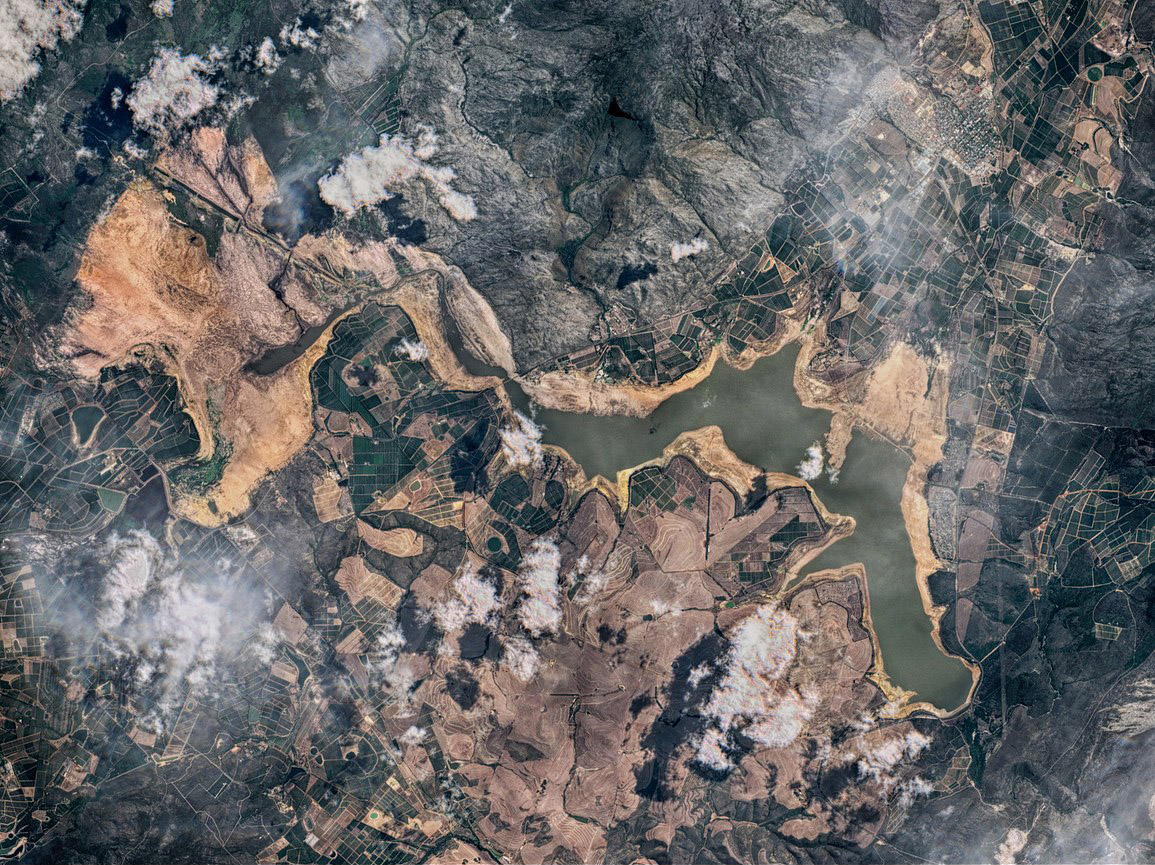
Satellite image of Theewaterskloof Dam near Cape Town at approximately 12% capacity, Feb 10 (Photo: Antti Lipponen/Flickr CC)
Water provides the ability for life to thrive; take it away, and it withers. A city in South Africa is currently in the fight for its life. A booming metropolis known for its beautiful beaches and wildlife, Cape Town, has been plagued by severe drought for the past 3 years, and now faces a water crisis of epic proportions. Households have been told to keep their water usage to 13.2 gallons per day, and residents apprehensively await the day their taps will run dry.
Businesses are attempting to do their part to reduce water consumption by replacing sinks with sanitizing stations and encouraging patrons to flush the toilet only when necessary. There is concern that the water issue will give rise to a public health crisis, with an uptick in diseases such as listeriosis, typhoid fever, Hepatitis A, and cholera, which have been seen before by cities in similar scenarios.
The looming fear among the populace is “Day Zero,” when taps will be shut off (except for hospitals, schools, etc.) and residents will have to stand in line at one of 200 stations around the city to get a rationed amount of water. This scenario, if it comes to fruition, could easily spark riots in the streets.
After weeks of fervour around “Day Zero,” the water and sanitation Minister, Nomvula Mokonyane, announced to Parliament that such a term or scenario did not come from the National Disaster Management Center. She attempted to placate those fearing the worst by discussing some of the interventions already in place to avert such a disaster.
Some do not believe that the crisis is real, but instead, “all political,” as stated by Cape Town resident Dr Shabir Karim, who believes that politicians simply want to create a crisis in order to consolidate power. “There are thousands of natural springs in South Africa, but only 350 are nationalised. The rest are under private control. Water should be free for all mankind. These corporates are trying to commoditize our free water.” Mokonyane expressed similar concerns regarding how much of the nation’s water was in private control and the percentage that went to agricultural (65 percent) rather than domestic use (23 percent).
As restrictions are still in place, the city’s Muslim residents are especially concerned, because they are required to perform ablutions before their multiple daily prayers, and without adequate water, they may have to do tayammum (an act of dry ablution using a purified sand or dust).
Over the years, Cape Town has been known for its strong commitment to environmental stewardship, and during the past few decades, displayed a strong commitment to conserving water, even amid a booming population. According to the New York Times, “The city’s water conservation measures – fixing leaks and old pipes; installing meters and adjusting tariffs – had a powerful impact. Maybe too powerful. The city conserved so much water that it postponed looking for new sources.”
Now, dams are functioning at a fraction of their capacity, with the city’s major reservoir, the Theewaterskloof Dam, operating at just 13 percent. Complacency was not the only factor. Like many African cities, Cape Town is troubled by corruption and mismanagement. The Department of Water and Sanitation has been criticised for overshooting water allocations for the agricultural sector, and for failing to properly release drought relief funds. The length and severity of the drought were simply not anticipated, but Cape Town is not the only city who has endured it.
South Africa is not new to strife. It is not new to violence or inequality. Its beauty and its resources have been a lure to outsiders for centuries. The coastal city of Cape Town is left to grapple with fear for its future. There are mixed messages regarding the severity of the crisis, and some saying to forget about “Day Zero” altogether. Yet, no one denies the 3-year drought. Will it always take a crisis to incite change? Instead of planning for one specific problem, nations would do well to invest in holistic infrastructure upgrades. Climate change can teach us resilience, or force it upon us. It is time for us to choose.
Sarah Sakeena Marshall, English Language Teacher, Environmental Columnist